Key takeaways:
- Feminist fashion promotes empowerment and self-expression while challenging traditional gender roles, creating a sense of solidarity among wearers.
- Ethical consumerism enables individuals to make impactful choices, advocating for fair labor practices and supporting sustainable brands.
- Key principles of ethical fashion include transparency, sustainability, and fair labor practices, fostering a deeper connection between consumers and producers.
- Future goals in ethical fashion involve prioritizing sustainability, embracing circular fashion, and celebrating diversity to create an inclusive industry.
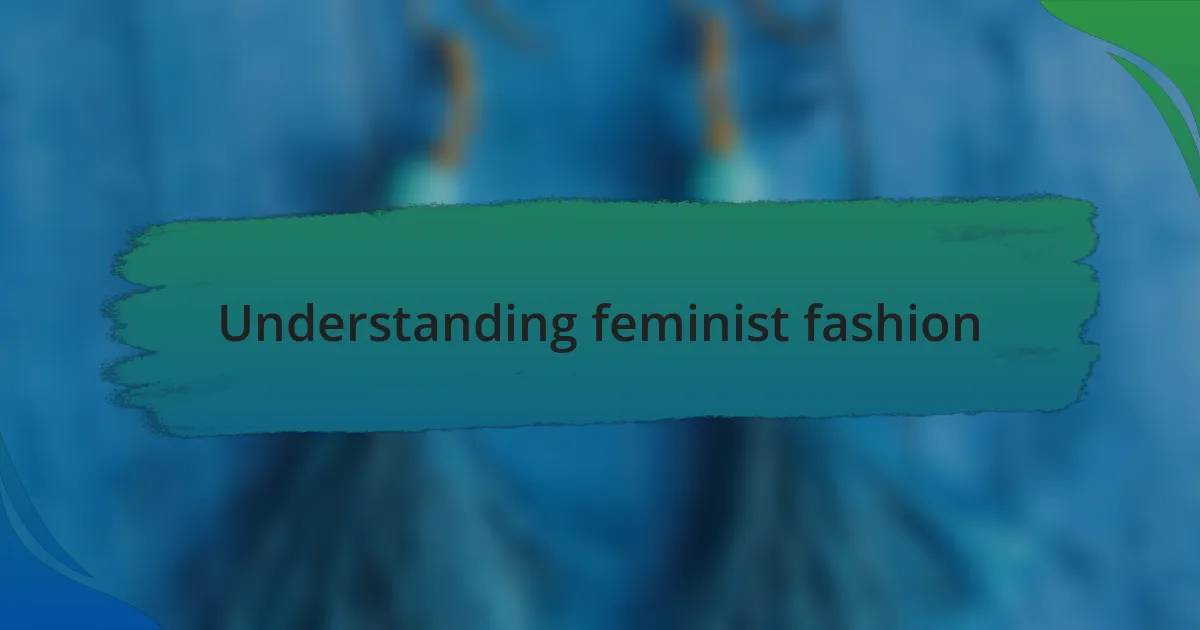
Understanding feminist fashion
Feminist fashion goes beyond merely clothing; it embodies a movement interconnected with social justice, empowerment, and self-expression. I remember my first encounter with a feminist fashion brand—seeing their bold designs made me feel part of a larger conversation about womanhood and identity. Have you ever worn something that felt like armor in the face of societal expectations? That’s the power of feminist fashion.
At its core, understanding feminist fashion involves recognizing the way clothing can challenge traditional gender roles and assert individual agency. I often reflect on how certain pieces in my wardrobe carry memories of protests and gatherings, serving as constant reminders of the values I stand for. Can a simple garment truly convey a message of resistance? I believe it can, resonating with those who choose to wear it.
Navigating this space, I find myself drawn to brands that prioritize ethical production and inclusivity. Each time I wear something from these labels, I feel a sense of solidarity with other women who share similar beliefs. It’s fascinating to consider how fashion can foster a sense of community, don’t you think? When we choose thoughtfully, we not only adorn our bodies but also align with a collective vision for a more equitable world.
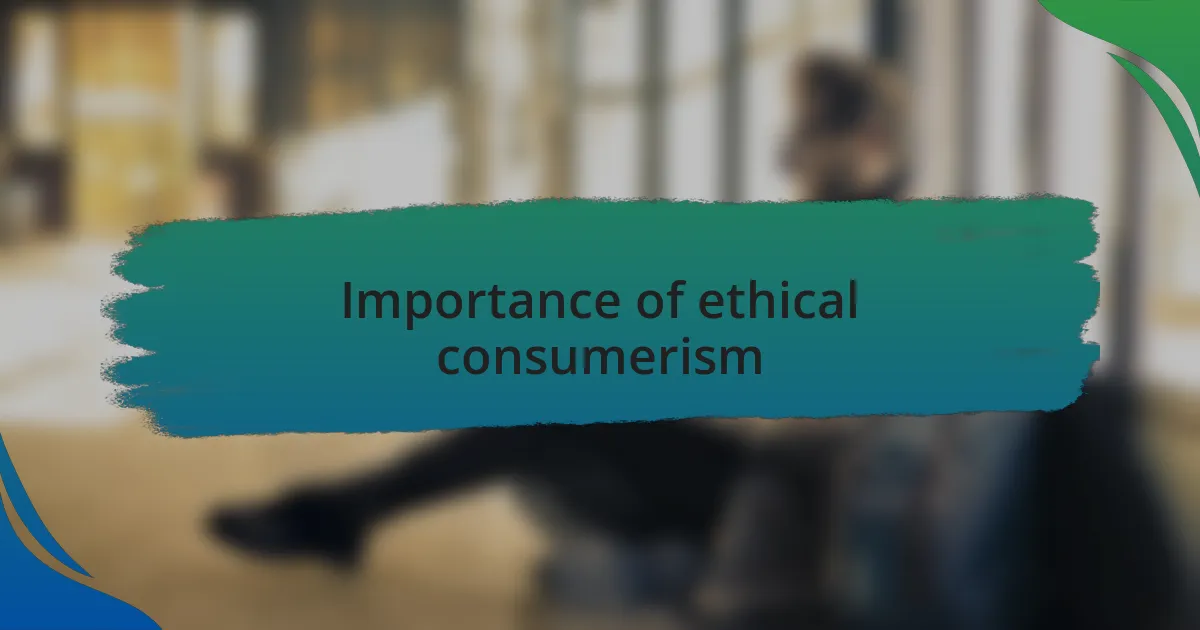
Importance of ethical consumerism
Ethical consumerism is pivotal because it empowers us to vote with our wallets. I recall a moment when I chose a sustainable brand over a fast-fashion giant, feeling a surge of pride. That choice was more than just a purchase; it was a statement about my values and the kind of world I want to support. Have you experienced that exhilarating moment of realizing your buying power?
Moreover, ethical consumerism helps combat the exploitation often present in the fashion industry. When I learned how much the workers behind my favorite clothes earn, it shifted my perspective completely. I can’t help but wonder: what stories are woven into the fabric of my garments? By supporting ethical brands, I’m advocating for fair wages and better working conditions for those who craft our clothes.
Lastly, the importance of ethical consumerism extends beyond individual choices; it ignites a movement. I remember attending a local boutique’s launch, where the founder shared not just the brand’s vision but the impact of each sale. It’s inspiring to think that our collective choices can fuel change. Isn’t it empowering to know that, together, we can reshape an industry?
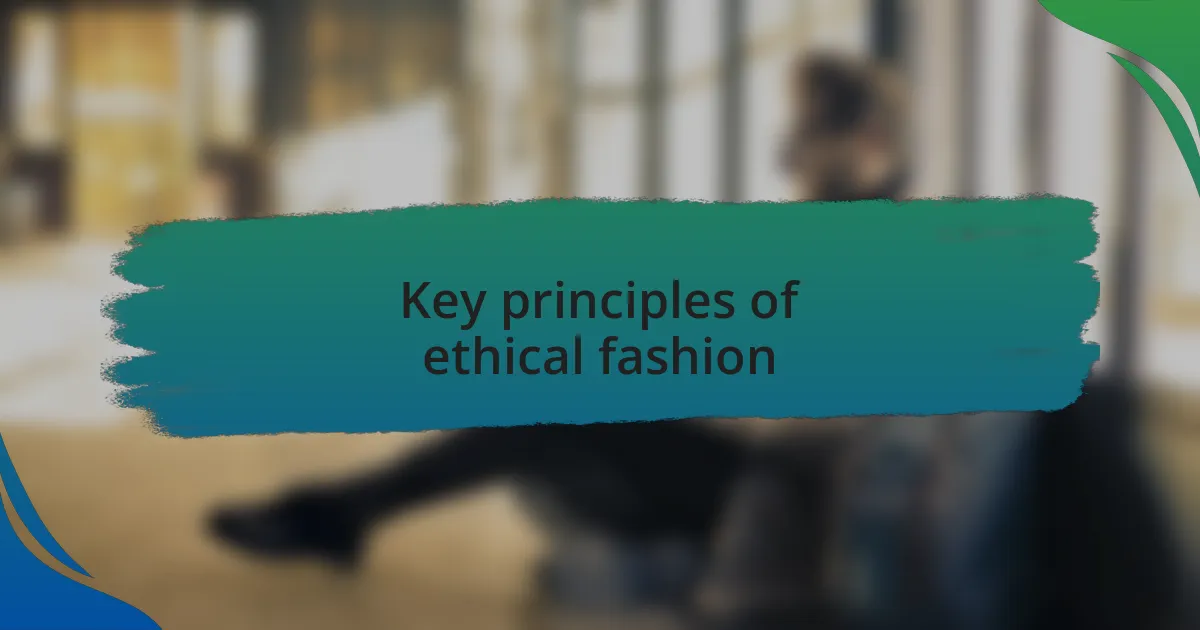
Key principles of ethical fashion
Key principles of ethical fashion revolve around transparency, sustainability, and fair labor practices. I distinctly remember when I first uncovered the idea of transparency in fashion. I had always admired a particular brand for its aesthetics, but once I saw their commitment to showing their supply chain, I could feel a deep connection forming. How could I not support a brand that laid everything bare, making me trust their intentions?
Sustainability is another cornerstone. Reflecting on my closet, I realized how many items were made from harmful materials. When I shifted towards brands that prioritize organic and recycled materials, it felt revolutionary. It wasn’t just about reducing my ecological footprint; it was an act of nurturing the planet for future generations. Have you ever thought about how your fashion choices echo into the future?
Lastly, fair labor practices are fundamental to ethical fashion. I still feel a pang of guilt whenever I recall my earlier fast-fashion indulgences, especially knowing how little workers in developing countries often make. Discovering brands that advocate for fair wages was a game changer for me. It transforms my shopping spree into a conscious effort to support artisans and laborers globally. Isn’t it remarkable how a simple t-shirt can become a symbol of fairness and equity?
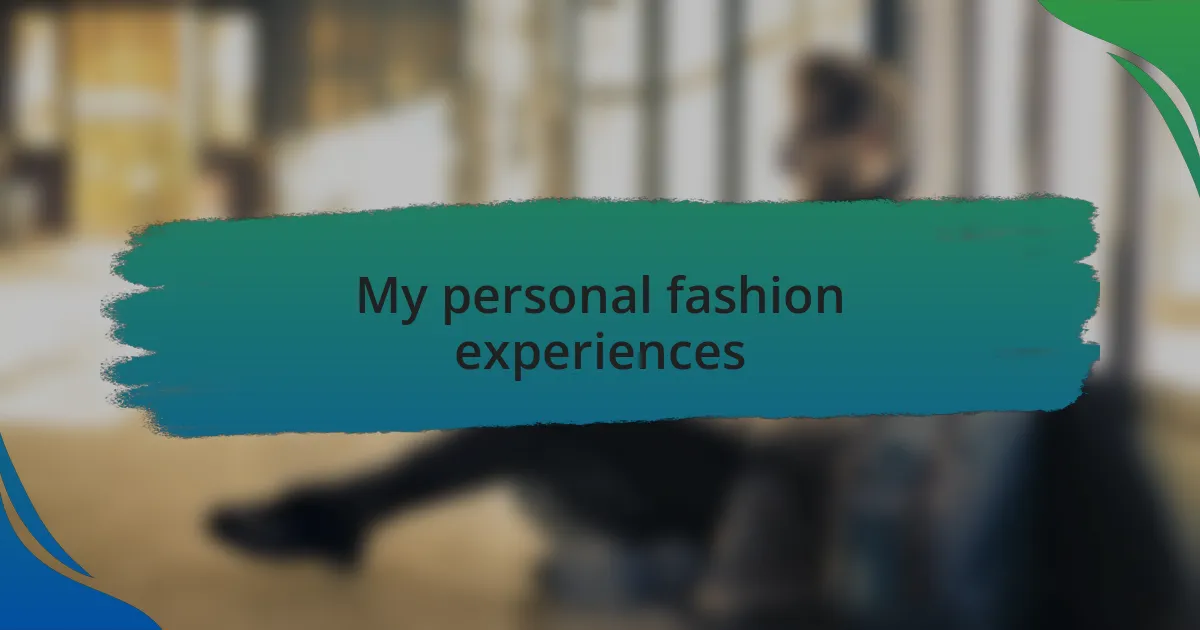
My personal fashion experiences
Fashion has always been a significant part of my life, but my journey took a turn when I experienced the thrill of thrifting. I stumbled upon a beautiful vintage dress at a local shop, and as I held it in my hands, I could practically feel the stories woven into its fabric. Each thread represented a piece of history that was both captivating and worthy of a second chance. Have you ever felt a similar rush upon finding a hidden gem that resonated with your values?
As I ventured deeper into ethical fashion, I made a conscious decision to support local artisans. I remember visiting a small crafts market where I met a woman handcrafting jewelry. Her passion was palpable, and it hit me that purchasing her pieces meant not just getting a unique accessory but also empowering her community. How often do we consider the impact of our choices on individuals rather than just brands?
One of the most rewarding experiences I’ve had was participating in a clothing swap event. Sharing garments with friends and exchanging stories about our style transformations was invigorating. Instead of merely acquiring new pieces, we celebrated sustainability and creativity. Have you ever thought about how sharing fashion can deepen connections and inspire new perspectives?

Discovering inspiring brands
As I explored the realm of ethical brands, I was continually amazed by the stories behind each label. For instance, I still remember the first time I discovered a brand that sourced its materials from recycled ocean plastics. It struck me how a beautiful handbag could not only elevate my outfit but also contribute positively to the environment. Have you ever paused to think about where your favorite pieces come from?
A standout moment in my journey was finding a brand focused on empowering women through fair trade principles. When I learned that my purchase directly supported artisans in developing countries, I felt a deeper connection to my wardrobe. Every time I wore that piece, it wasn’t just fashion; it was a reminder of the strength and resilience of women around the globe. Does fashion become more meaningful when you know the story behind it?
One of my favorite discoveries was a local brand collaborating with struggling artists. Their limited-edition collections featured original artwork that breathed new life into conventional clothing. It felt rewarding to support creativity while sporting unique pieces that sparked conversations. Have you ever considered how the right brand can turn everyday wear into a form of self-expression and advocacy?

Lessons from my journey
As I navigated my ethical consumer journey, I learned that every choice I make has a ripple effect. One afternoon, while browsing a thrift store, I stumbled upon a vintage dress that spoke to me. It felt like more than just a find; it was a reminder of the stories held in each thread. How many hidden treasures might you discover if you dig a little deeper into secondhand shops?
Additionally, I’ve come to realize that being an ethical consumer is as much about community as it is about product. Attending a local fashion market, I engaged in conversations with artisans who shared their passions and struggles. That connection transformed my shopping experience into something deeply personal—each item became a piece of someone’s dream. Isn’t it rewarding to know that your purchase supports not just a brand, but a whole community?
Lastly, I’ve learned the importance of patience and mindfulness in this journey. I used to impulse-buy, driven by trends, but embracing an ethical approach has made me more discerning. Now, I often pause before purchasing, pondering its impact on people and the planet. In this way, my wardrobe is not only curated; it’s a reflection of my values. How can you incorporate intentionality into your own shopping habits?
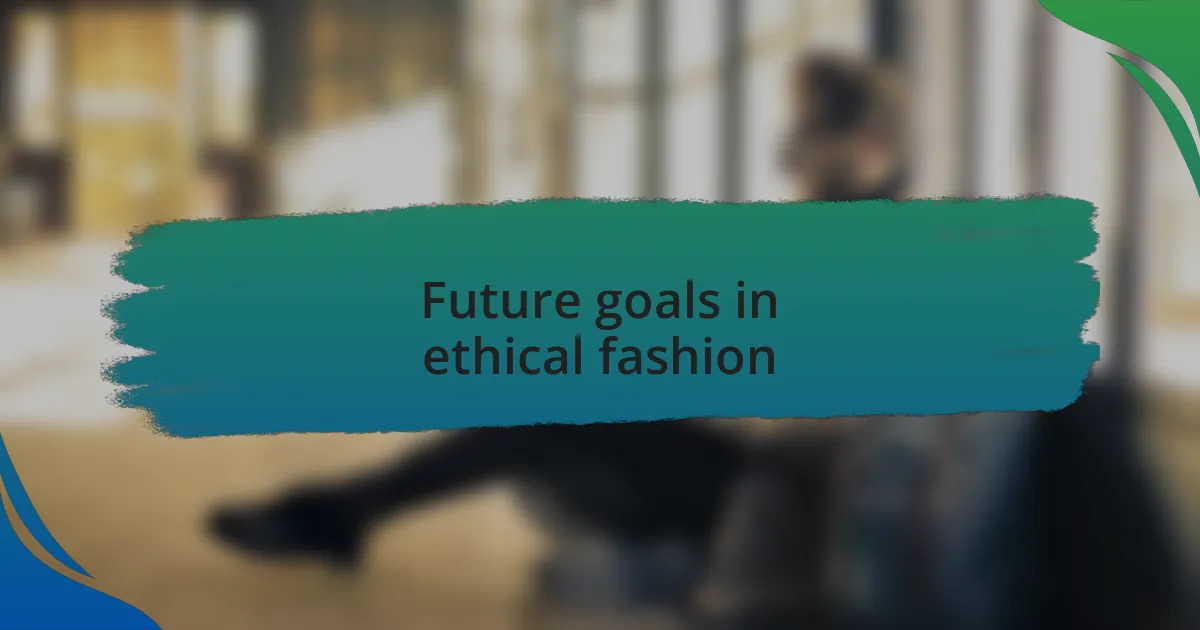
Future goals in ethical fashion
When I think about the future of ethical fashion, I envision a world where sustainability becomes the default standard rather than an exception. For instance, I dream of brands prioritizing transparency, allowing consumers to trace the origin of every piece they buy. Can you imagine how empowering that would be?
I’ve also seen a growing interest in circular fashion, where clothes are designed to be reused, recycled, or remade. During a collaborative project with local designers, we explored innovative ways to repurpose fabric scraps. Watching garments come back to life reminded me that creativity can redefine waste. How might we inspire others to embrace this mindset?
In my ideal future, we celebrate diversity in ethical fashion, showcasing styles that reflect all bodies and cultures. When I attended an inclusive fashion show, I felt a sense of belonging that transcended mere clothing. Each design told a story, and I couldn’t help but wonder: what other narratives could we uplift through our fashion choices?